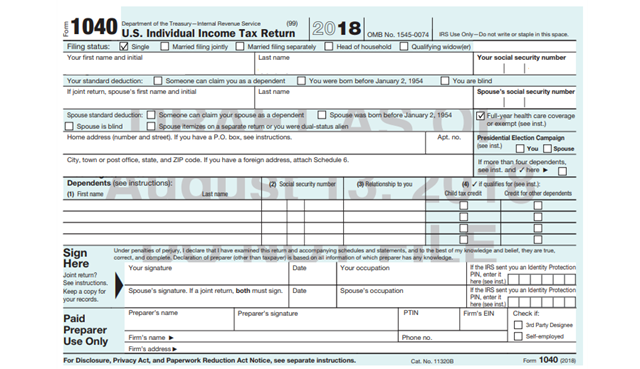By Michael D. Glass, EA
In an unprecedented move, last week a Congressional tax committee submitted a request for six years of the president’s returns from the Internal Revenue Service (IRS).
Under the law, Congress is empowered to request from the Treasury Department tax returns or related information on any tax filer and have done so requesting six years of the Presidents tax returns from 2013 to 2018.

Since June 16, 2015, the beginning of his candidacy the President has refused a half-century tradition of disclosing a history of tax returns. The traditional annual “public audit” of the Presidents tax return has been challenged due to a claim that “he remains under audit.”
On April 4th the President said, until such time that he is not “under audit” he will continue to refuse to release his tax returns. With a legacy of false statements and exaggerations, what are the odds that President Trump’s tax returns are really under audit?
As a former IRS official, I know that there is always official correspondence that confirms whether an IRS audit is being conducted. A second communication is sent to an individual or company when the audit is concluded. There would be correspondence if tax issues were identified requiring that a subsequent year be picked placed under examination. These confirmations, however, are protected under section 6103 of the Internal Revenue Code. The same Code section prevents the IRS from telling the public whether the President remains under audit. But there is nothing preventing the President from showing the American public the letter he received from the IRS that he is under audit.
Based on my experience, if the President is still being audited for the six years (2013-2018), it is likely that the IRS is examining substantial omission of income and could potentially be in the midst of a civil fraud or a criminal investigation. Its possible the IRS is developing the biggest fraud case on a President the past two years. It is equally possible that there is no longer a case or audit being conducted.
My experience tells me that no audit could be taking place. With the implementation of the new summons enforcement International Directive on Information Document Requests (IDR), an audit does not usually last this long.
While the rate of audits are low and dropping the IRS continues to use data-driven approaches and algorithms to guide audits of high global wealth taxpayers which flags large, unusual and questionable items and make comparisons to historical tax return norms. The Trump International organization falls into the category of a high global wealth large case taxpayer, based on the size of income and assets. The Presidents own Federal Election Commission (FEC) disclosures identified over 500 limited liability corporation entities (515 of which 378 were registered in Delaware) either foreign or domestic under the Trump International umbrella.
An IRS audit of these business returns falls under the jurisdiction of the Large Business and International Division (LB&I). The IRS resources in the Large Case or Team Audit programs in LB&I are the lowest in history. Those programs were recently eliminated in other divisions such as Tax Exempt & Government Entities Division (TEGE). This requires the IRS to approach only a limited number of these types of audits with narrow scopes reviewing focused and specific issues.
It is possible that the examination of Trump International may be continuing through a large case Team audit. The large case Team audit process involves examinations of large taxpayers that are very big with many related entities and numerous transactions that require a team approach to examine a single tax year at a time or a repetitive process.
These types of taxpayers may require the Large Business and International Division (LB&I) team to examine subsequent years when similar issues to the prior year or questionable issues are identified on the subsequent year that is filed parallel to the closing out of the initial audit year. Due to the size or number of issues involved many taxpayers and their representatives often table the issues until the end of an examination of multiple years and try to resolve any differences with the IRS examination team and manager and to close the case. If a taxpayer does not agree, subsequently the case is directed to the Appeals Division with the subsequent year tax examination starting simultaneously. The Appeals Division with executed statute extensions by the taxpayer may hold all tax year returns open for a final closing conference on all unagreed issues with a taxpayer.
Based on my experience, if the President is truly under audit as he claims, I suspect that he is choosing to stay under examination since “under audit” provides him a continued reason for further non-disclosure as the Trump organization awaits final resolution and conclusion of all years audits at one time with the IRS.
While the President continues to claim that he is under audit, nothing in the law prevents him from releasing his tax returns and making the case that he has paid his fair share of taxes.
——–
Michael D. Glass is a former Area Manager and large case Team Manager for the IRS and has a deep understanding of IRS internal procedures
